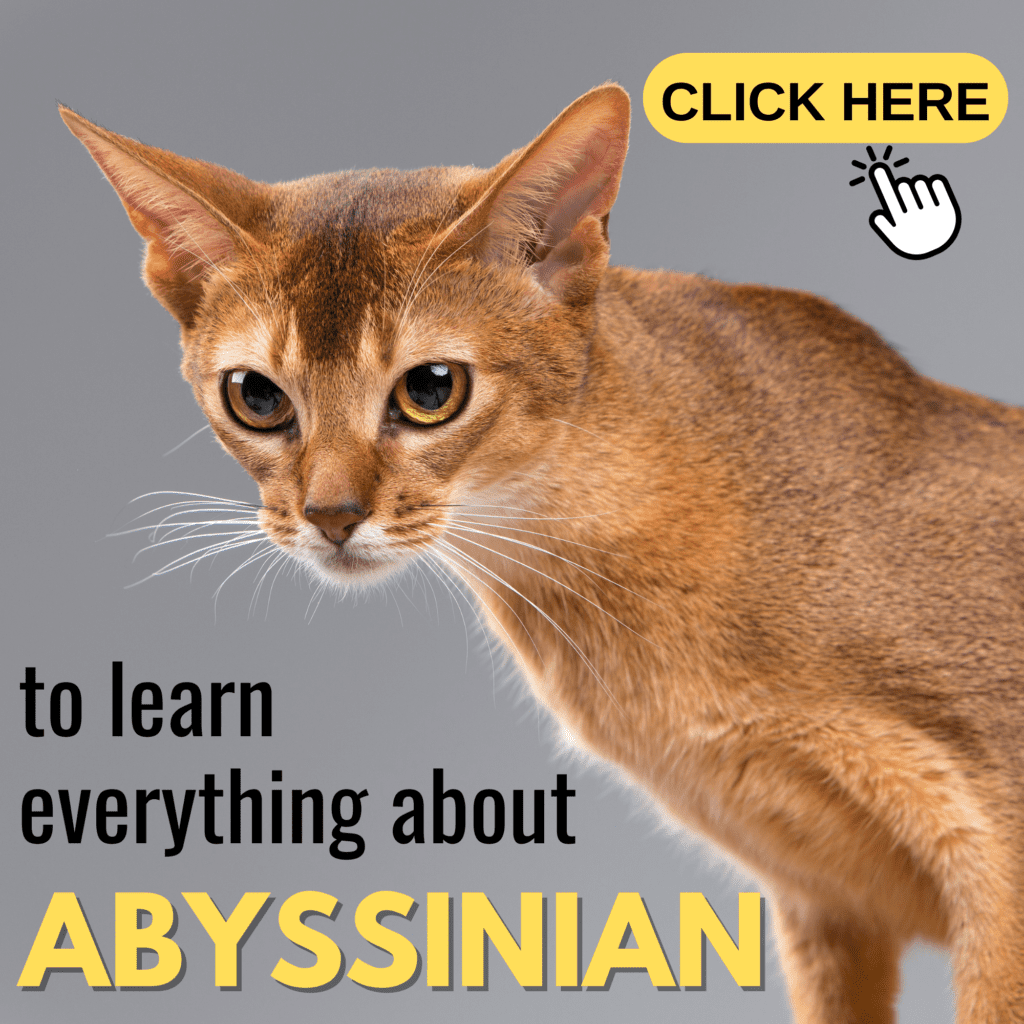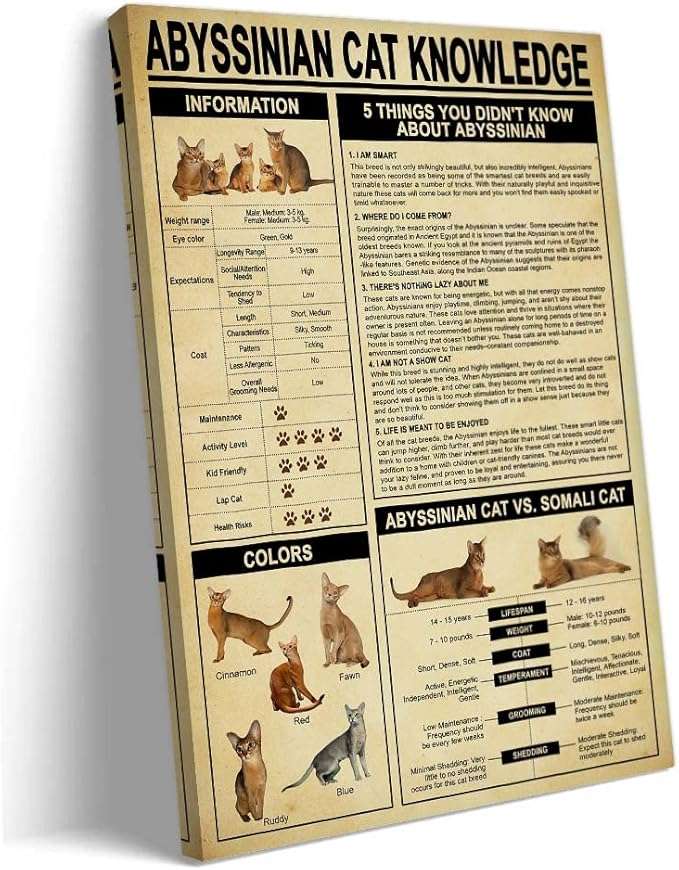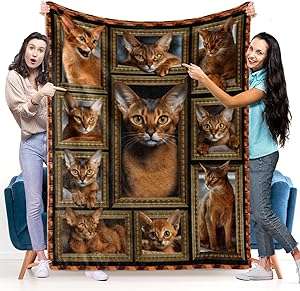The Truth About Abyssinian Cats: Myths and Facts Explained
This post may contain affiliate links, which means I’ll receive a commission if you purchase through my link, at NO EXTRA COST TO YOU
Abyssinian cats captivate feline lovers with their striking looks, playful personalities, and rich history. However, many myths surround this beautiful breed. This blog will clear up common misconceptions while presenting intriguing facts about Abyssinians. By understanding the truth, you can appreciate these fascinating cats even more.

The History of Abyssinian Cats
Before diving into the myths and facts, let’s briefly explore the history of Abyssinians. Originating in ancient Egypt, Abyssinians likely descended from cats worshipped by pharaohs. They possess a distinct appearance with their ticked coats, resembling the wild cats of Africa. Many people believe that this breed carries the elegance of ancient royalty, which certainly adds to its allure.
Myth 1: Abyssinian Cats Are Hyperactive
One common myth about Abyssinian cats is that they are overly hyperactive. While they are indeed playful and energetic, they also have calm moments. Abyssinians enjoy interactive play and mental stimulation, which often contributes to their energetic reputation. However, they also appreciate lounging and relaxing with their humans.
To keep your Abyssinian happy, engage in regular playtime with toys that challenge their minds. This way, you channel their energy into productive activities. As a result, they can be active without being excessively hyper.
Fact 1: Abyssinians Are Highly Intelligent
Abyssinians rank among the most intelligent cat breeds. Their curiosity and desire to explore make them quick learners. They enjoy interactive toys that require problem-solving skills, like puzzle feeders. Furthermore, many Abyssinians excel in training, responding well to commands and tricks.
If you want to bond with your Abyssinian, consider incorporating training sessions into your routine. Positive reinforcement methods work best, as they thrive on praise and rewards. By nurturing their intelligence, you will create a deeper connection with your feline friend.
Myth 2: Abyssinian Cats Are Unaffectionate
Some people believe that Abyssinians are aloof or unloving. In reality, they form strong bonds with their families and often seek affection from their owners. Abyssinians are known for their playful nature and love to engage in activities with their humans. They may follow you around the house or curl up on your lap when they seek companionship.
To strengthen your bond, spend quality time with your Abyssinian. Whether through play, grooming, or simply relaxing together, these moments help them feel secure and loved.
Fact 2: Abyssinians Thrive on Social Interaction
Abyssinian cats are social creatures that enjoy the company of both humans and other pets. They thrive in environments where they can interact and play. In fact, leaving them alone for long periods can lead to boredom and behavioral issues. If you have a busy lifestyle, consider adopting a second pet to keep your Abyssinian company.
Regular social interaction not only benefits your Abyssinian but also enriches your home. You’ll find joy in watching their playful antics and discovering the strong personalities they possess.
Myth 3: Abyssinian Cats Require Extensive Grooming
Another myth suggests that Abyssinians require extensive grooming due to their unique coats. While they do have short, dense fur, their grooming needs are relatively low. A weekly brushing will help reduce shedding and keep their coats healthy. Moreover, their coat is resistant to matting, making it easier to maintain.
However, regular grooming allows you to check for any skin issues or parasites, ensuring your cat remains healthy. Thus, while they may not require intensive grooming, it’s still an important aspect of their care routine.
Fact 3: Abyssinians Are Adaptable Cats
Abyssinian cats adapt well to various living situations, from apartments to houses. Their sociable nature and intelligence help them adjust to new environments and routines. They thrive in homes with ample opportunities for play and exploration.
If you move to a new location or bring in another pet, your Abyssinian will likely adapt quickly. Just provide a stable environment and plenty of love to ensure their happiness.
Myth 4: Abyssinians Are Prone to Health Problems
Some people mistakenly believe that Abyssinian cats are prone to numerous health issues. While every breed has potential health concerns, Abyssinians are generally healthy cats. Common health problems may include dental issues and certain genetic disorders, but with proper care, many Abyssinians live long, healthy lives.
Regular veterinary check-ups play a crucial role in maintaining your Abyssinian’s health. Furthermore, ensuring they have a balanced diet, regular exercise, and proper dental care contributes to their overall well-being.
Fact 4: Abyssinians Have a Unique Coat
One of the most striking features of Abyssinians is their short, ticked coat. The ticking refers to the darker bands of color on each hair, giving them a distinctive appearance. This feature adds depth and richness to their coat, making them stand out among other breeds.
Their coats come in several colors, including ruddy, red, blue, and fawn. Regardless of the color, regular brushing helps keep their coat looking its best while removing loose hair and dirt.
Myth 5: Abyssinians Are Difficult to Train
Some people think that Abyssinian cats are challenging to train. However, this breed responds well to positive reinforcement and consistent training methods. Because they are intelligent, they can learn various commands and tricks with patience and practice.
To start training, use treats or toys as rewards. Keep training sessions short and enjoyable to hold their attention. With time, you may be amazed at how quickly your Abyssinian picks up new skills.
Fact 5 : Abyssinians are actually intelligent and highly trainable
While their independent nature might give the impression that they are difficult to train, these cats are quick learners. Abyssinians enjoy mental stimulation, so using interactive toys and reward-based training can yield excellent results. They can be trained to follow commands, perform tricks, and even use puzzle feeders. The key to success is engaging their curious minds with positive reinforcement, rather than expecting them to behave like a more passive or docile breed.
Conclusion: Understanding Abyssinian Cats
Abyssinian cats are truly unique and charming companions. By debunking common myths, we can better appreciate their playful personalities, intelligence, and adaptability. Remember, regular social interaction, grooming, and training will help ensure a happy and healthy life for your Abyssinian.
So, if you’re considering bringing one of these captivating cats into your home or already have one, cherish the bond you share. Understanding their needs and characteristics will allow you to provide a loving and enriching environment. Embrace the joy of owning an Abyssinian cat, and celebrate the wonderful qualities that make them special!







